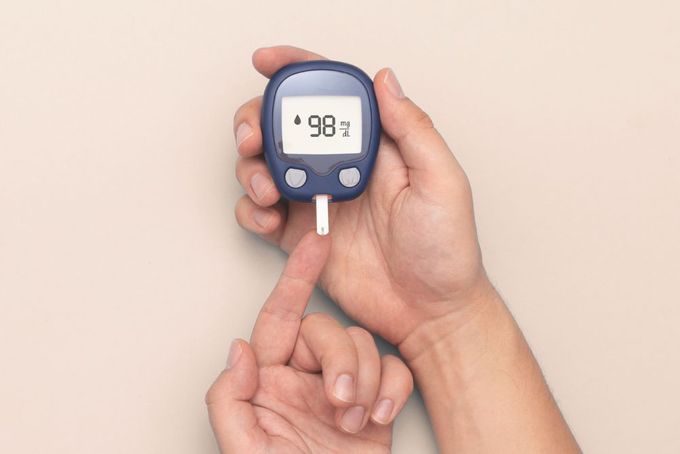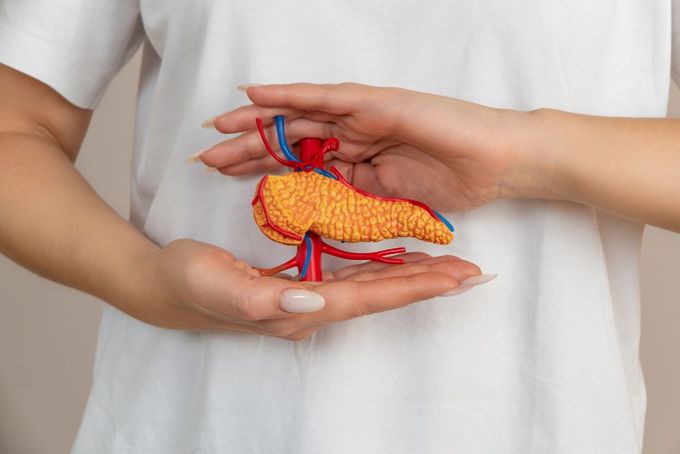The Connection Between Blood Sugar & Hormone Health
Updated July 29, 2025

Do you struggle from low energy, poor sleep, waking up multiple times a night (even just to use the bathroom), irregular periods, cold hands and feet, subclinical thyroid labs (hypothyroidism), hair loss, mood swings, low basal body temperature, no sex drive, infertility, and/or digestive issues?
If you answered yes to any of these, exploring the stability of your blood sugar may reduce these symptoms and support healthier hormones and fertility.
Blood Sugar Health is Hormone Health!
Blood sugar regulation begins in the pancreas, liver, and brain. All three organs play important roles in optimal digestive function and endocrine (hormone) function. Therefore, blood sugar regulation is crucial for hormone health.
The pancreas, an exocrine gland, has the critical job of manufacturing hormones that regulate blood sugar levels. When you eat a meal, the carbohydrate-rich food gets broken down into simple sugars, or glucose. The pancreas then responds by releasing the hormone insulin. Insulin's job is to shuttle glucose into your body's cells, to be used as energy and help with cell regeneration and repair! Leftover glucose goes into the liver where it is converted into glycogen, a form of energy your muscles rely on.
The problem can be when you eat too little or wait too long to eat before meals and you experience a steep decline in available blood sugar (energy). At this point when blood sugar dips you can feel dizzy, cold, and all of the stereotypical signs of being hangry. In response, your pancreas then pumps out the hormone glucagon. Glucagon tells the liver to convert its stored glycogen (stored sugar) back into glucose (usable sugar/energy) and to be released into the bloodstream to bring blood sugar levels back up. When blood sugar levels go back up, you can feel back to "normal," mood is stabilized, and you can experience a boost in energy.
This feedback system is in place to make sure your brain, heart, and muscles get the energy they need to do their essential jobs—keeping you alive! It is truly a team effort between insulin and glucagon.
Upsetting the balance
The problem is chronically low blood sugar impairs this symbiotic partnership between the hormones, insulin, and glucagon. The stress of having to continually convert stored energy to help keep vital organs running puts a major stress on this system. The body will perceive the rise and fall of blood sugar as a crisis state and slow down the metabolism and rely on its generator, the adrenals. The adrenals then will step in and secrete their emergency stress hormones, cortisol and adrenaline, to pick up the energy slack. When blood sugar is dipping too low too often, this can cause what is known in the health and wellness industry as "adrenal fatigue" or more the more medically recognized term, HPA Axis dysfunction.
Yes, even something as seemingly benign as chronic low blood sugar is more than enough for the body to feel stressed and threatened. When our body is forced to constantly respond to stress, fertility and hormone production become less of a priority, which results in a potentially slow metabolism and a sluggish thyroid.
The key here is to stabilize blood sugar to allow the body to detoxify and secrete the proper amount of sex hormones. When we have stabilized blood sugar, we have thriving and happy hormones. Which can mean no PMS, ovulation with each cycle, a robust thyroid and metabolism, high sex drive, appropriate hunger signals, and energy throughout your cycle!
5 Ways you can stabilize blood sugar
- Eat a balanced meal of protein carb and fat. Throughout the day, I aim for 40% protein, 30% carbs, and 30% fat during each meal.
- Eat within 30 minutes of waking up.
- Eat every 3-4 hours.
- Eat a snack before bed; My favorite is a high-quality dairy (goat milk, A2 milk, or raw milk if available) a ½ TB of honey and a pinch of Himalayan sea salt.
- Drink coffee with breakfast, never on an empty stomach!
Check-in With your body!
How do I know if my blood sugar is stabilizing and my body is healing from the stress?
I advise my clients to use Tempdrop to keep track of their basal body temperature to confirm ovulation. When ovulation is confirmed each month, we can see how the body is responding by the length of the follicular phase or luteal phase.
For example, when our body is stressed out, and blood sugar is all over the place, ovulation may be delayed, lengthening the follicular phase (preovulatory phase).
I also see in my clients when they are struggling with blood sugar dysregulation, that their luteal phase (post-ovulatory phase) can be shorter than 10 days, which is not ideal. As our blood sugar becomes more stabilized and our body begins to heal, we have a more healthy, normal cycle length.









